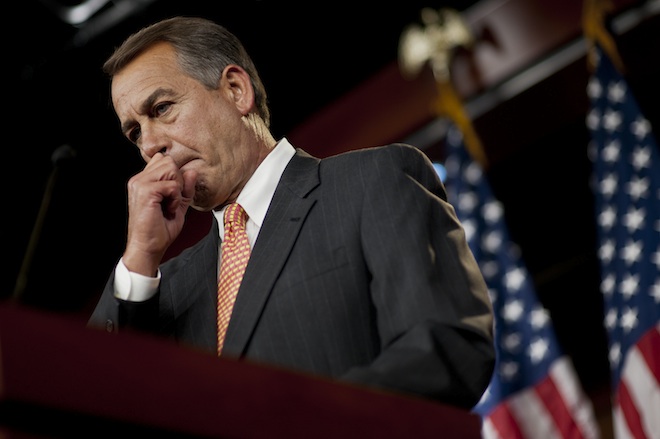Republicans are coming to terms with the fact that they will have to cede real, higher tax revenues to President Obama if they want to avoid the full expiration of the Bush tax cuts.
But while Democrats have been explicit about what they want from the GOP — a higher top income tax rate on high earners — Republicans have been vague about what they want in return.
When asked, Republicans insist that Democrats will have to accept “structural reforms” to support programs like Medicare, Medicaid, and Social Security if Republicans are to relent on taxes. But neither Democratic nor Republican aides can publicly say what would pass the GOP’s “structural reform” test.
“What do you think they mean by structural changes?” House Minority Leader Nancy Pelosi asked rhetorically at a Capitol press conference last week. “Do they mean reducing benefits to our — to America’s great middle class? What do we mean? I mean, let’s define our terms. What do they mean by structural changes? … Is that a euphemism for I am going to cut your benefit if you are a middleâaged senior? Is that what structural change means? No, I don’t support that.”
Asked Friday what the House GOP’s terms are, a top aide to Speaker John Boehner said, “Republicans’ willingness to support additional revenue via tax reform is conditional on it being accompanied by significant entitlement reforms that begin to address the problem of the debt. There are a variety of ways in which this can be accomplished. As the Speaker has indicated, we’re open to talking with Democrats about any and all serious and responsible entitlement changes they’re willing to discuss. Without such spending controls, any plan to avert the fiscal cliff is not a balanced approach,” but provided no specifics or approach preferences.
In the recent past, Republicans have proposed dramatic reforms to all three of those programs — partial privatization of both Medicare and Social Security, and dramatically reduced federal spending on and authority over Medicaid.
But their ideas lack popular support, and a majority of the voting public rejected them on Election Day. Even if Republicans continue to advocate these plans, they don’t have the leverage to force Democrats to accept them.
Privately, some Republicans hope to return to the kinds of proposals Obama and Boehner nearly settled upon last summer during their failed debt ceiling negotiations — including a higher Medicare eligibility age, and a less generous formula for calculating Social Security cost of living adjustments.
These proposals constitute de facto benefit cuts, and enjoy little support among rank and file Democrats — though despite a new post-election political reality some leading Dems have left the door open to accepting ideas like these.
Publicly, Democrats have proposed both using Medicare’s purchasing power in various ways to reduce spending on the program, and lowering reimbursements to Medicare providers — either directly, or by strengthening the Independent Payment Advisory Board, a Medicare cost-cutting panel created by the Affordable Care Act.
But even if Republicans broadly endorse cutting Medicare spending, they get nothing from demanding reforms Democrats already support as the “price” of accepting higher taxes on top earners.
That means whichever pound of flesh Republicans hope to extract will be politically vital — and it’s why they’re dancing around the issue, and pressing Obama to speak up first.






